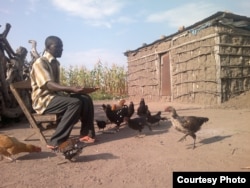If you live in sub-Saharian Africa in a malaria endemic area, it might not be such a crazy idea to sleep next to a chicken. It turns out some mosquitoes are repelled by the odor of chickens, potentially offering another cheap protection method against the mosquito-borne illness.
Most mosquitoes, including those that carry the often-deadly malaria parasite, like to bite humans. They transmit the disease through a blood meal.
They also take blood meals occasionally from cattle, goats and sheep. But they are selective feeders. Mosquitoes don’t like the taste of chicken blood, so poultry rarely gets bitten.
Swedish researchers made the discovery in field studies in Ethiopia. They set up traps to capture the most common mosquito in the area, Anopheles arabiensis, in 11 houses in Addis Ababa.
Investigators then tested the blood inside the mosquitoes, finding blood from all sorts of animals. But rarely was there any blood from chickens.
That begs the question: Should people in malaria endemic regions sleep next to a chicken? It’s a joke that Rickert Ignell hears all the time.
“Oh yes. We do that all the time [make jokes] ... and the joke is also that people should carry a chicken around to protect themselves against malaria. But it hasn’t really caught on.”
Ignell is a professor at the Swedish University of Agricultural Sciences, interested in studying the chemical attraction of disease-carrying insects, including malaria mosquitoes.
In those 11 houses, Ignell recruited 11 volunteers to sleep under untreated bed nets with traps, baited with chicken compounds, nearby.
According to Ignell, “One of the tests we did was to actually suspend a chicken next to the traps that we used. And we actually saw about a 95 percent reduction in the trap capture. Indicating that chickens and chicken odors alone could actually repel the mosquitoes from the houses.”
Chicken feathers
Ignell said the odors that were offensive to the mosquitoes came from compounds in the chickens’ feathers. The compounds are cheap and some are already available.
The idea of keeping a chicken inside a house to ward off malaria mosquitoes is not such a bad idea.
“Many places in Ethiopia and many places in Africa that we’ve been working in, people actually keep their livestock indoors. Not often the chickens, but that is certainly something one could try to see if it works or not,” Ignell said.
Ignell said the chicken method of insect repellent would have to be in combination with insecticide-treated bed nets for fuller protection.
Protection inside and out
Unlike other mosquitoes that feed mostly in houses, Ignell said Anopheles arbiensis also bites people outdoors.
“And especially during the time when people are sitting outdoors, when it’s too hot to be indoors.”
Ignell would like to see whether the chicken odor, contained in some sort of wax that can be burned like a candle, also repels mosquitoes outside the home once they get a whiff of poultry.
The findings were published in Malaria Journal.
No funding
Ignell said he has no reason to believe the scent of chicken would not keep other mosquitoes at bay.
However, Ignell and his colleagues haven’t been able to get funding to continue their work into chicken compounds.
According to the World Health Organization, there were approximately 214 million malaria cases in 2015 and an estimated 438,000 malaria deaths, mostly in children. Increased prevention and control measures have led to a 60 percent reduction in malaria mortality rates globally since 2000, says the WHO.
Sub-Saharan Africa continues to carry a disproportionately high share of the global malaria burden, and Ignell says mosquitoes are becoming resistant to the insecticide in treated bed nets, and there’s been a slow increase in the incidence of malaria in sub-Saharan Africa.





